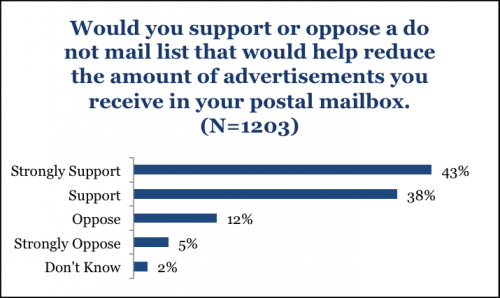Survey shows most Americans want a 'Do Not Mail' initiative

(Phys.org)—A new Privacy and Advertising Mail survey by UC Berkeley School of Law finds that a very large majority of Americans, across all ideologies, age groups, and income levels support a Do Not Mail initiative. The national data, released today by the law school's Berkeley Center for Law & Technology (BCLT), shows that an overwhelming 81 percent of respondents support the creation of a service similar to the popular Do Not Call registry.
"Our survey is in line with consumer polls conducted over the last four decades that reflect a frustration with advertising mail," said co-author Chris Hoofnagle, a Berkeley Law lecturer and director of information privacy programs at BCLT.
Advertising material now comprises more than half of all mail delivered to private homes and businesses. Many Americans not only consider it a nuisance, but also a privacy violation. "Americans may view advertising mail as a privacy issue because of database activities underlying the targeting of mail. They also may dislike the sense of intrusion created when advertising material flows into the home," said co-author Jennifer M. Urban, assistant clinical professor of law.
Despite years of survey research showing broad objection to advertising mail, the United States Postal Service (USPS) has courted direct marketers. The researchers cite the agency's dire financial needs as a possible impetus for this approach. The Postal Service has lost tens of billions of dollars the last few years, losing about $57 million per day in the last quarter alone.
Privacy concerns have captured the attention of U.S. regulators, leading to the passage of several laws regulating marketing practices, but advertising mail has remained untouched. Although the Direct Marketing Association has operated a self-regulatory opt-out system since 1971, the "Mail Preference Service," it only blocks only about 1 percent of advertising mail.
"The USPS' fiscal challenges have created incentives for the agency that directly contravene recipients' desire to manage advertising mail," said Urban. "The Postal Service has created many innovations to help advertisers increase mail volume, but it's done little to assist Americans manage unwanted advertising mail."
Congress did direct the Postal Service to implement a system to stop pandering, called "prohibitory orders." This could, in theory, be used to address privacy concerns from unwanted mail, as well. But it is paper-based and labor-intensive, requiring the recipient to open and send each rejected mail piece to a specific postal office. It is considered an ineffective and outdated way to limit direct mail, according to the report.
More information: papers.ssrn.com/sol3/papers.cf … ?abstract_id=2183417
Provided by University of California - Berkeley

















